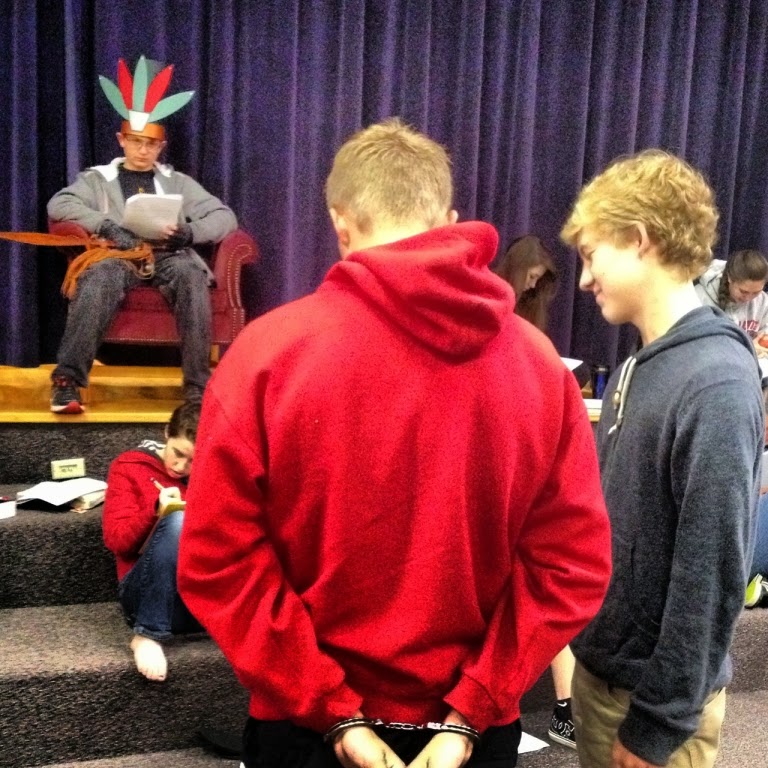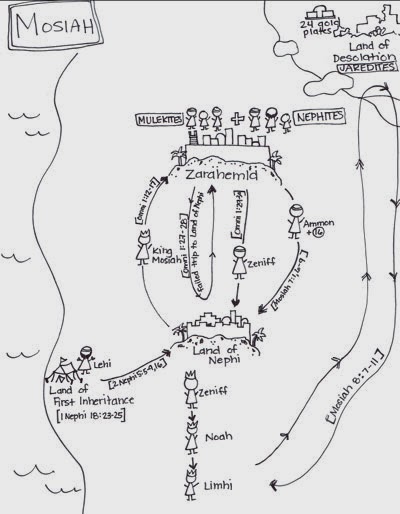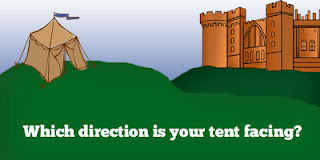
Mosiah 2-5 contains the final address by King Benjamin to the people in Zarahemla. King Benjamin was not only an inspired prophet he was also a military genius, a proponent of education, a community reformer, and devoted father. To learn more about King Benjamin, you can visit the Neal A. Maxwell Institute for Religious Scholarship's website and check out this amazing chapter in the book
King Benjamin's Speech - That Ye May Learn Wisdom, Edited by John W. Welch, 1998.
Benjamin, the Man: His place in Nephite History - By John W. Welch
"From all we can learn, Benjamin was a very effective and successful
ruler. Despite considerable challenges, he maintained a stable
government throughout his long lifetime and established peace in his
lands...." read more
Where is your tent pitched?
In
Mosiah 2:1, 5-6 we read about the people of Zarahemla as they gathered to hear the final words of their King and prophet. As you will see in Mosiah 2:6, the people "pitched their tents round about the temple, every man having his tent with the door thereof towards the temple." This description is significant because the tent can represent our personal lives as well as our family as a whole. Just as the people of Zarahemla faced their tents towards the temple to hear the words of the prophet, we can turn the focus of our lives to the gospel and our personal covenants. These righteous individuals are blessed to hear the words of the prophet which can lead them to "dwell with God in a state of never-ending happiness" (Mosiah 2:41).
However, there are those who choose not to pitch their "tents round about the temple." In Genesis 13 we read about Abram (otherwise known as Abraham) and Lot, two brothers. They are both very wealthy men, “rich in cattle, in silver, and in gold.” Together they leave Egypt and head to Bethel.
"Lot also, which went with Abram, had flocks, and herds, and tents. And the land was not able to bear them that they might dwell together; for their substance was great, so they could not dwell together.” (1 Gen. 13:5-6)
There began to be fighting between their herdsman over grazing rights. So just like in the old west they decided that “this here town isn’t big enough for the both of us.” Abraham and Lot decided that they would have to go their separate ways to keep the peace and to ensure that there are enough resources to support their families.
Abraham tells his brother that he can have his pick, and Abraham will take what’s left.
So Lot looks around and sees this choice piece of real estate in Canaan next to this town called Sodom. You may have heard of it.
12 Abram dwelled in the land of Canaan, and a dwelled in the cities of the plain, and pitched his tent toward Sodom.
As you read Genesis 13:12; notice where Lot settled his “tent” and family – “in the cities of the
plain” and “toward Sodom”.
Abraham went the other direction. In contrast he settled his family on the “plain of Memre” and “there built on altar” – so in the midst of Abraham's new settlement he built a mini-temple.
Now back to Lot… a few years after Lot settles down “in the plains”, facing “toward Sodom” there arose a disputation between several kings in the area including the kings of Sodom and Gamorah. The invading kings and their armies encounter Lot’s family. Let’s read Genesis 14:12 and see what they find.
12 And they took a, Abram’s brother’s son, who dwelt in Sodom, and his goods, and departed.
What is the difference between where Lot originally settles in Gen 13:12, and where we find his family in Gen. 14:12? Notice that Lot's son is now found dwelling "in" Sodom amongst those that the Lord called "wicked and sinners" (Genesis 13:13). It didn't take very long for Lot's family to move from their original location outside the city of Sodom to living smack-dab in the middle of it.
How does one go from living out in the plains with their tent door only facing the city to living in the city amidst all the wickedness and sin? Does the direction of where our tent/home/family is facing have an impact on our future and current happiness and well being?
Taking what we have learned from Lot and Abraham and their choices of tent locations, what more can we learn from King Benjamin's people and their choice of tent placement? What application does principal of "location" have in your life?
Where is your tent pitched? “facing the temple”? “in the plain”? or “in the city”?
Elder Quinton L. Cook has a wonderful article that talks about making sure our tent door is pointed in the right direction --
Being in the World but Not of the World.
"We inevitably must make choices. If we know the doctrines and principles
of the gospel, we can make wise decisions. If our lives are pure, the
Spirit will guide us. Then we will be able to symbolically pitch our
tents toward the temple (see Genesis 13:18) and the covenants we have made to the Lord, and we will be in the world and not of the world...If our lives are pure, the Spirit will guide us. Then we will be able to
symbolically pitch our tents toward the temple and the covenants we
have made to the Lord."





